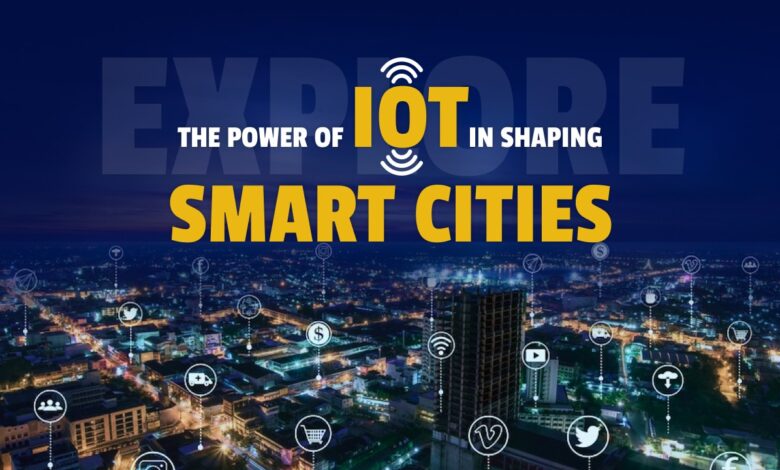
The rapid advancement of IoT Applications Revolutionizing Smart Cities is transforming urban living in Spain, ushering in a new era of connectivity and innovation. From optimizing transportation systems to enhancing energy efficiency and public safety, Internet of Things (IoT) technologies are at the heart of this evolution. These applications enable seamless communication between devices, improving the quality of life for residents and making city operations more efficient.
As Spain embraces the smart city revolution, cities like Barcelona, Madrid, and Valencia are at the forefront of implementing cutting-edge IoT solutions. This article explores how IoT Applications Revolutionizing Smart Cities are driving economic growth, environmental sustainability, and technological innovation in Spain, offering a glimpse into the future of urban development.
Read More: IoT Applications Revolutionizing Smart Cities in Spain
The Concept of Smart Cities in Spain
The adoption of IoT Applications Revolutionizing Smart Cities underscores the transformation of traditional urban landscapes into interconnected hubs of innovation.
Smart cities leverage IoT to create environments where infrastructure, resources, and services are optimized through data-driven decisions. Spain’s commitment to smart city initiatives reflects its ambition to become a global leader in sustainable and efficient urban development.
IoT in Urban Transportation Systems
Transportation showcases one of the most impactful IoT Applications Revolutionizing Smart Cities, improving mobility and reducing congestion.
IoT-enabled sensors and platforms monitor traffic patterns, optimize public transit schedules, and provide real-time updates to commuters. Cities like Madrid are deploying these technologies to enhance road safety, streamline traffic flow, and promote the use of eco-friendly transport options.
Smart Waste Management Solutions
Waste management highlights how IoT Applications Revolutionizing Smart Cities contribute to environmental sustainability.
IoT sensors integrated into waste bins monitor fill levels, enabling efficient collection routes and reducing operational costs. In cities like Barcelona, these solutions minimize carbon emissions and support cleaner urban environments.
Energy Efficiency Through IoT
Energy management exemplifies the transformative potential of IoT Applications Revolutionizing Smart Cities, promoting sustainable practices.
Smart grids and IoT-enabled meters allow for real-time energy monitoring and optimization. Spanish cities are leveraging these tools to reduce energy consumption, integrate renewable sources, and create greener urban spaces.
IoT in Public Safety and Emergency Response
Public safety is enhanced by IoT Applications Revolutionizing Smart Cities, ensuring quicker responses and better resource allocation.
Connected devices such as surveillance cameras, air quality monitors, and emergency alert systems improve urban safety. IoT-driven insights enable Spanish cities to proactively address security concerns and mitigate risks.
Water Management in Smart Cities
Water conservation is a vital area where IoT Applications Revolutionizing Smart Cities are making a significant impact.
IoT-enabled sensors monitor water distribution networks for leaks, optimize irrigation, and ensure efficient water usage. These technologies are helping Spanish cities conserve this precious resource while maintaining service quality.
IoT-Powered Smart Buildings
Smart buildings highlight another dimension of IoT Applications Revolutionizing Smart Cities, enhancing living and working spaces.
Connected devices monitor energy usage, control lighting and HVAC systems, and improve building security. These advancements make buildings more sustainable, efficient, and comfortable for occupants in Spain’s urban centers.
The Role of IoT in Urban Planning
Urban planning is increasingly influenced by IoT Applications Revolutionizing Smart Cities, enabling data-driven decision-making.
IoT technologies provide real-time data on population density, resource usage, and infrastructure conditions. This information allows Spanish city planners to design smarter, more inclusive urban spaces that meet the needs of residents.
IoT in Environmental Monitoring
Environmental monitoring underscores the role of IoT Applications Revolutionizing Smart Cities in addressing climate challenges.
Sensors measure air quality, noise levels, and temperature, providing actionable data to improve urban environments. Spanish cities are using these insights to implement policies that promote cleaner, healthier communities.
IoT Applications in Healthcare Services
Healthcare services benefit from IoT Applications Revolutionizing Smart Cities, enhancing patient care and system efficiency.
IoT devices track patient health metrics, streamline hospital operations, and enable telemedicine services. These advancements ensure that urban populations in Spain have access to high-quality, connected healthcare solutions.
Enhancing Urban Mobility with IoT
Urban mobility exemplifies the transformative potential of IoT Applications Revolutionizing Smart Cities, fostering smarter travel experiences.
IoT-powered apps provide route optimization, shared mobility services, and real-time traffic updates. Spanish cities are adopting these solutions to promote sustainable transport and reduce commuter stress.
IoT in Education and Smart Learning Environments
Education is a key area where IoT Applications Revolutionizing Smart Cities are reshaping learning experiences.
Connected classrooms and digital learning platforms enhance educational delivery and accessibility. IoT tools also enable data-driven decisions in school management, improving outcomes for students across Spain.
The Role of IoT in Retail and Commerce
Retail and commerce benefit from IoT Applications Revolutionizing Smart Cities, offering personalized and efficient shopping experiences.
IoT-driven analytics optimize inventory, improve customer engagement, and streamline supply chains. Spanish retailers are leveraging these technologies to stay competitive and meet evolving consumer demands.
Challenges in Implementing IoT in Smart Cities
While impactful, IoT Applications Revolutionizing Smart Cities face challenges such as high costs and data privacy concerns.
Implementing IoT technologies requires significant investment and robust cybersecurity measures. Addressing these challenges is essential for ensuring sustainable adoption in Spain’s urban areas.
Government Initiatives Supporting IoT Adoption
Government initiatives play a crucial role in advancing IoT Applications Revolutionizing Smart Cities across Spain.
Programs like the Spanish Smart Cities Network (RECI) and EU-funded projects provide financial and technical support. These efforts drive innovation and enable cities to integrate IoT solutions effectively.
Future Trends in IoT for Smart Cities
Emerging trends highlight the evolving landscape of IoT Applications Revolutionizing Smart Cities, shaping the future of urban living.
Advancements in AI, edge computing, and 5G connectivity promise enhanced capabilities for IoT solutions. Spanish cities are well-positioned to lead these innovations, creating smarter and more resilient communities.
The Economic Impact of IoT in Smart Cities
The economic benefits illustrate the significance of IoT Applications Revolutionizing Smart Cities, boosting productivity and innovation.
IoT technologies attract investments, create jobs, and reduce operational costs for city administrations. Spain’s focus on IoT integration strengthens its position as a leader in the smart city movement.
Read More: IoT Applications Revolutionizing Smart Cities in Spain
Conclusion
The widespread adoption of IoT Applications Revolutionizing Smart Cities is transforming urban living in Spain, enhancing efficiency, sustainability, and connectivity. From energy management and transportation to public safety and healthcare, IoT technologies are driving innovation across all aspects of city life.
As Spain continues to invest in smart city solutions, the future promises even greater advancements. By addressing challenges and embracing new trends, Spanish cities can solidify their roles as global leaders in the smart city revolution, setting benchmarks for other nations to follow.
FAQs
1. What are IoT applications in smart cities?
IoT applications in smart cities include connected devices for energy management, transportation, waste management, and public safety, enhancing urban efficiency.
2. How is IoT transforming Spanish cities?
IoT enables real-time monitoring, data-driven decisions, and optimized resource usage, revolutionizing urban infrastructure and services in Spain.
3. Which Spanish cities are leading in IoT adoption?
Barcelona, Madrid, and Valencia are at the forefront of IoT integration, driving smart city initiatives across various sectors.
4. What challenges exist in implementing IoT in smart cities?
Key challenges include high implementation costs, data privacy concerns, and the need for robust cybersecurity measures.
5. What is the future of IoT in Spanish smart cities?
Emerging trends like AI, 5G, and edge computing will further enhance IoT applications, creating smarter and more sustainable urban environments.











